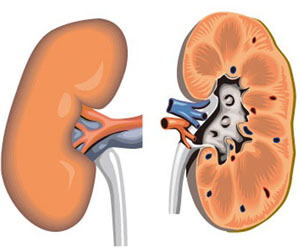
Chronic nephritis is a short form of chronic glomerular nephritis. It is an immune inflammatory disease involving glomerulus and caused by multiple etiological factors. It is usually lingering, in most cases, slowly progressive.
Proteinuria, hematuria and cylindruria can be found in routine uronoscopy.
Edema, high blood pressure and impairment of renal function can also be found in most patients.
There is no such term as nephritis in ancient Chinese medical literature. By its clinic manifestations, it falls into the category of "shui zhong" (edema), "niao xue"(hematuria) and "xu lao"(consumptive disease) in TCM. The causes can be either endogenous or exogenous. Exogenous causes refer to six exogenous pathogenic factors or pyogenic infection of skin, while endogenous causes are mainly dysfunction of the lung, spleen and kidneys, and also involvement of the heart and liver. At the advanced stage, those cases with deficient healthy qi and excessive pathogenic factors are manifested as vomiting, edema, anuresis, convulsion, bleeding and coma.